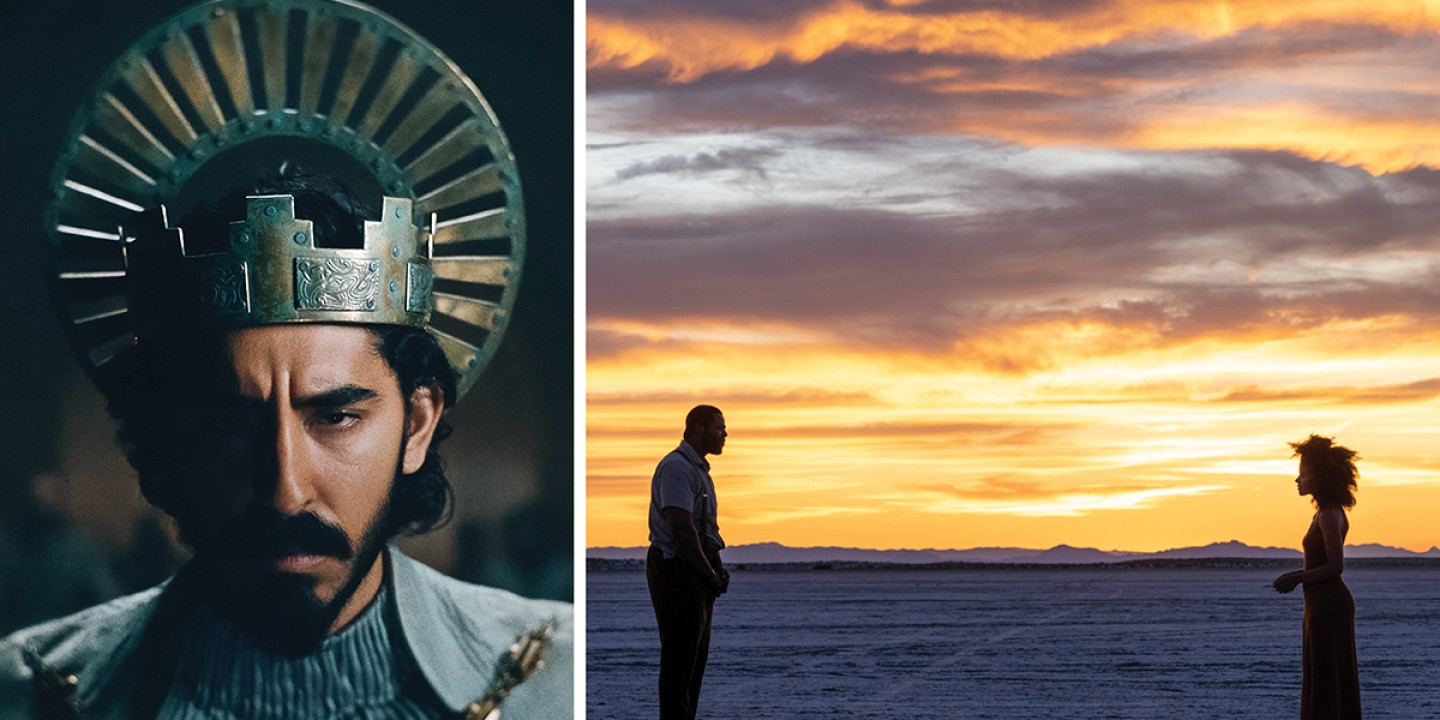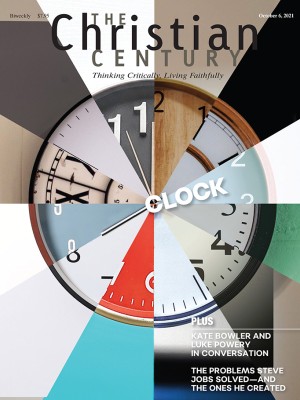Watching The Green Knight and Nine Days on the big screen
Both movies made me grateful for directors with risky, new visions—and the space to enjoy them.

I didn’t realize how much I had been craving space in my watching experiences until I found myself skipping work to watch movies in a movie theater on back-to-back mornings. It wasn’t just the space of being in a movie theater—though 10 a.m. on a Tuesday gave me most of the theater to myself—but the spaciousness of the medium itself. I chose sprawling, ambitious movies that made me grateful for directors with risky visions, even if they don’t always work out.
The Green Knight (directed by David Lowery) is a loose adaptation of the anonymous 14th-century chivalric poem Sir Gawain and the Green Knight. It wrestles with deep cultural mythology about heroes, legends, virtue, and honor. As in the original poem, on Christmas night in King Arthur’s court, a mysterious knight arrives unbidden and challenges anyone present to a game, the rules of which are simple: the challenger may strike the Green Knight one blow if a year later he will come to the Green Chapel to receive the same blow himself. Gawain (played by Dev Patel), young and headstrong and defending a sense of honor he’s never really tested, decapitates the Green Knight and spends the rest of the year facing the prospect of receiving the same blow in kind.
Read our latest issue or browse back issues.
Even before he sets out to find the Green Chapel, Gawain sees his story performed in pantomime and dreams of the final song that will be sung about his deeds. Whether he is worthy of a song—and whether it even matters if he does the things sung about—is the central preoccupation of the film. Gawain is obsessed with his knightly virtue, but perhaps less so with actually being virtuous. Given how chivalric ideals about heroic greatness still permeate our popular tales (of adventure broadly and of masculinity most explicitly), the film challenges a cultural assumption that greatness makes up for a lack of goodness.
These moral explorations are carefully handled, with clever inversions of timeline that produce just enough of a puzzle quality to give the viewer something to work out when leaving the theater. But the movie enthralled me most in its visual meditations, which suggest the terrible cost of Christian colonization of the Saxon people and the ecological destruction embedded in centralized imperialism. Neither theme comes up in the dialogue, but both are presented visually in the wide and wild landscapes that exist outside Camelot’s gates, in the ruinous violence of a recently abandoned battlefield, and in the perilous natural world that does not yield to Gawain’s quest or his sense of virtue. This is the first movie about medieval Europe I’ve seen that seems at all concerned about what sort of peace the knights were upholding and at what cost.
The fact that the movie does this entirely through visual storytelling is a visceral reminder of the pleasures of the medium of film made for a big screen. I have always loved watching movies in movie theaters, but I have watched whatever I could in whatever medium my life allowed—often on my iPad while I washed dishes. Beggars, and working parents, can’t be choosers. But after 18 months of all watching condensed to small screens in a small apartment, often rewatching comfort shows or working my way through endless iterations of Disney and Marvel plotlines, at the theater I felt enveloped in the huge expanses of the screen, swallowed up in the enormous forests that filled my sight lines, amazed at a vision that did not adhere to safe blockbuster conventions, almost laughing out loud in delight at the sheer size and scale of it all. I simply did not want it to end.
I was back in the theater the next morning, seeking a repeat immersion. I had been waiting more than a year to see Nine Days (directed by Edson Oda), based largely on what I had read about the strong performance by Winston Duke, who anchors the strange metaphysical fable about what happens to souls before they are born into this life. Duke plays Will, a lonely judge of souls who approaches his work more like a middle manager interviewing candidates for an office job than the decider of human fate.
Neither the myth nor the morals of this movie held together for me. I could not tell why we would want to imagine a new metaphysical dimension to life where the vast majority of human souls are weeded out from a chance of existence on the basis of one person’s judgment of how he imagines they will live. The only character who experiences real moral growth is Will, and this amounts to the rather banal realization that life is worth the risk of pain and suffering. This realization only comes to him at the expense of other characters whose fates are in his hands, introducing a kind of abusive-boss syndrome on a cosmic scale.
But there was one aspect of the film that reminded me why I was in a theater in the first place. At a key moment in each soul’s pre-birth journey, Will offers to create an experience from the human realm—feeling ocean waves on their feet or riding a bike, for example. Using the techniques of filmmaking—large screens with projected images, lighting and sound effects, staged environments—he creates an immersive illusion for each soul. This became a meta-meditation on the nature of film itself. These sequences echoed the experience of the viewer watching the film and helped reveal the small pleasures of human existence by training our attention on details and sensations we might otherwise ignore. I still didn’t buy the overall metaphysical proposition of the movie, but I found these sequences very moving.
As we move into year three of pandemic school, I am sure I will spend most of my screen time on small screens in small spaces, probably sucked back into the Marvel and Disney hamster wheel, but I hope my ticket purchases help prompt directors to keep taking risks with new visions. I will be ready for the immersions of the big screen whenever I can get them and eager to have my attention refocused and my imagination enlarged.
A version of this article appears in the print edition under the title “Back to the big screen.”






